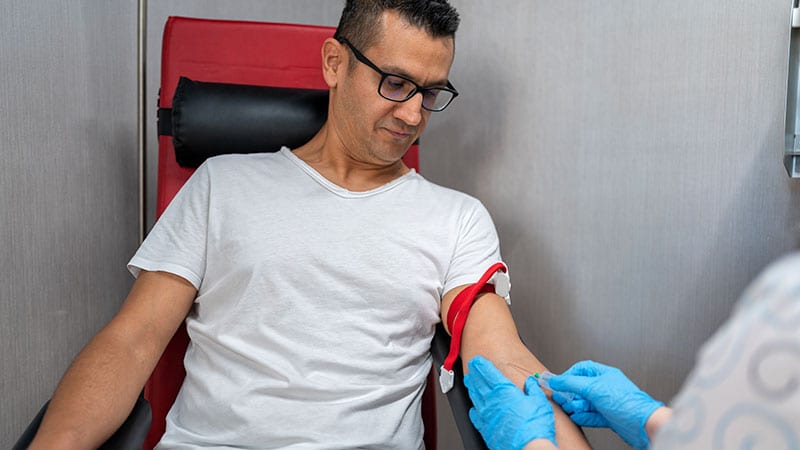Evaluating the Effectiveness and Limitations of a New Blood-Based Colorectal Cancer Screening Test
Główne pojęcia
The new blood-based colorectal cancer screening test, Guardant Health Shield, has lower sensitivity and specificity compared to established screening methods, and should be offered only to patients who decline other screening options.
Streszczenie
The article discusses the recently introduced blood-based colorectal cancer (CRC) screening test, Guardant Health Shield, and its potential role in primary care.
The key points are:
- The Shield test identifies alterations in cell-free DNA characteristic of CRC, and has an 87.5% sensitivity for stage I-III CRC, but only 13% sensitivity for advanced precancerous lesions.
- The test has a 89.6% specificity, meaning about 1 in 10 participants without CRC or advanced precancerous lesions had a false-positive result.
- While the Shield test meets the criteria set by CMS for Medicare coverage, it has a higher false-positive rate and lower sensitivity/specificity compared to traditional screening methods like fecal immunochemical test (FIT) and multitarget stool DNA (FIT-DNA) tests.
- Cost-effectiveness analyses suggest that offering the blood test to patients who decline other screening options can save lives, but at a very high cost per life-year gained.
- The author concludes that the blood test should not substitute established CRC screening tests, but be offered only to patients who decline those options, as it will miss most precancerous polyps.
Dostosuj podsumowanie
Przepisz z AI
Generuj cytaty
Przetłumacz źródło
Na inny język
Generuj mapę myśli
z treści źródłowej
Odwiedź źródło
www.medscape.com
CRC Screening in Primary Care: The Blood Test Option
Statystyki
The Shield blood test had an 87.5% sensitivity for stage I, II, or III colorectal cancer.
The Shield blood test had only a 13% sensitivity for advanced precancerous lesions.
The Shield blood test had a 89.6% specificity, meaning about 1 in 10 participants without CRC or advanced precancerous lesions had a false-positive result.
A cost-effectiveness analysis found that offering a blood test to patients who decline screening colonoscopy saves additional lives, but at the cost of more than $377,000 per life-year gained.
Cytaty
"Shield's test characteristics were recently evaluated in a prospective study of more than 10,000 adults aged 45-84 at average risk for CRC. The test had an 87.5% sensitivity for stage I, II, or III colorectal cancer but only a 13% sensitivity for advanced precancerous lesions."
"A cost-effectiveness analysis found that offering a blood test to patients who decline screening colonoscopy saves additional lives, but at the cost of more than $377,000 per life-year gained."
Kluczowe wnioski z
by Kenneth W. L... o www.medscape.com 04-22-2024
https://www.medscape.com/viewarticle/crc-screening-primary-care-blood-test-option-2024a10007gf
Głębsze pytania
How can primary care providers effectively communicate the limitations of the blood-based CRC screening test to patients to manage expectations and ensure appropriate follow-up?
Primary care providers can effectively communicate the limitations of the blood-based CRC screening test by engaging in thorough discussions with patients. It is crucial to explain that while the blood test may have certain advantages, such as convenience, it is not a standalone test for CRC screening. Providers should emphasize that the blood test has lower sensitivity and specificity compared to traditional screening methods like colonoscopy or stool tests, meaning it may miss detecting precancerous polyps. Patients need to understand that a positive result from the blood test necessitates further evaluation through a diagnostic colonoscopy to confirm the presence of CRC or precancerous lesions. By providing clear and detailed information, setting realistic expectations, and stressing the importance of follow-up procedures, primary care providers can ensure that patients make informed decisions regarding their CRC screening options.
What factors, beyond cost-effectiveness, should be considered when evaluating the potential role of blood-based CRC screening tests in clinical practice?
Beyond cost-effectiveness, several factors should be considered when evaluating the potential role of blood-based CRC screening tests in clinical practice. One crucial factor is the test's accuracy and reliability in detecting CRC and precancerous lesions. Providers need to assess the sensitivity, specificity, and overall performance of the blood test compared to established screening methods to ensure its effectiveness in early detection. Additionally, the accessibility and ease of implementation of the blood test in primary care settings play a significant role. Consideration should also be given to patient preferences and acceptance of the test, as well as the impact on healthcare resources and workflow. Integration with existing screening programs, guidelines, and recommendations is essential to ensure seamless incorporation of the blood-based test into routine clinical practice.
How might advancements in blood-based cancer screening technologies in the future impact the landscape of CRC prevention and early detection?
Advancements in blood-based cancer screening technologies in the future have the potential to significantly impact the landscape of CRC prevention and early detection. As these technologies continue to evolve, they may offer improved sensitivity and specificity, making them more reliable for detecting CRC and precancerous lesions. Enhanced accuracy could lead to earlier diagnosis, potentially reducing mortality rates associated with CRC. Furthermore, advancements in blood-based screening tests may enhance patient compliance and participation in screening programs due to factors like convenience, reduced invasiveness, and ease of use. These technological developments could broaden the reach of CRC screening, particularly among individuals who are hesitant to undergo traditional screening methods. Overall, future advancements in blood-based cancer screening technologies hold promise for enhancing the effectiveness and accessibility of CRC prevention and early detection efforts.
0
